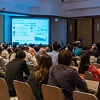By Joining you agree to MachPrinciple's Terms and Conditions and Privacy Policy
Click to Login
Please check your email. A registration confirmation link will be sent to your mailbox..
A registration confirmation link has been sent to your email. Please check your email and finish the registration process.

Search a Conference through our dedicated search page

The Gordon Research Seminar on Eye Movements is a unique forum for graduate students, post-docs, and other scientists with comparable levels of experience and education to present and exchange new data and cutting edge ideas. The focus of this meeting is to cover recent advances in our knowledge of the brain-s oculomotor system and its interaction with visual and cognitive networks. We will discuss how activity across these networks facilitates crucial processes for orienting to salient features in the environment, and complex cognitive processes. A preliminary description of the sessions is as follows: Session 1: “Orienting in Space” How do the eyes, and the brain, participate in ensuring appropriate interaction with objects in our environment? This session will describe cutting edge research on how the brain accounts for the spatial relationships between various components of orienting including the eyes, items in the visual field, and movement parameters. Session 2: “Distributed networks subserving eye movement control” What are the widespread networks underlying the control of eye movements, and how can we probe them? This session will describe novel methodologies that address how eye movement control is orchestrated by the interaction among functional networks and subnetworks at various scales, from microcircuit to multiple brain regions. Session 3: “The eye as a window to cognition” Our increasing knowledge of oculomotor circuitry makes it an ideal platform through which to probe a diverse range of cognitive processes, and also to understand how these processes are affected throughout the course of disease. This session will combine ocular measures (e.g., pupillary responses and saccade metrics) and innovative methodological approaches to understand cognitive function in the healthy brain, across the lifespan, and in disease states. Session 4: Emerging themes in eye movement research and where to go from here: The GRS will also include a mentorship session, which will allow trainees to learn from a diverse range of individuals who started their careers in academic, and went on to pursue successful careers in different arenas either within, or outside, of academia. The overarching goal of both the mentorship session and the GRS more generally, is to encourage networking and collaboration among trainees. The mentorship panel for the 2019 includes four panelists: Two well established professors, who will share their career trajectories in academia, discuss their views on emerging themes in neuroscience, and comment on the skills trainees should develop in order to be successful in research. These panelists have not only have been extraordinarily successful with publishing in scientific journals, but they have successfully mentored several graduate students and post-doctoral fellows. 1) Prof. Karl R. Gegenfurtner, Professor, Department of Psychology, Giessen University, Germany Also as the editor in chief of the Journal of Vision, he can share his point of view from an editorial perspective, and inform trainees about the current challenges in publishing scientific work and highlight upcoming trends in the field of vision. 2) Dr. Gunnar Blohm, Associate Professor, Centre for Neuroscience Studies, Queen’s University, Canada. Also as the co-founder and co-director of the summer school in Computational Sensory-Motor Neuroscience (CoSMo) he has tremendous experience in training students and post-docs and offering professional development sessions. He will discuss emerging trends within neuroscience, including big data and publishing in open access journals. Additionally, our panel will include two recent PhD students who have transitioned into exciting positions outside of academia, while still being active within the research community. These panelists can add exceptional value to this session by introducing graduate students and post-docs to career paths that they fail to learn enough about during their academic training. Their unique perspectives will stimulate the consideration of exciting and impactful career paths in science aside from working in an academic institution. 3) Dr. Scott Murdison, Postdoctoral Research Scientist at Facebook Reality Labs, Seattle, USA Dr. Murdison, with background in computational neuroscience, is now at Oculus/Facebook Reality Labs, performing exciting experiments involving vision and eye movements with direct applications in product development. 4) Ada Le, Associate at BEworks, Toronto, Canada Dr. Le, with background in experimental neuroscience (fMRI), is now at BEworks consulting firm, employing behavioral science research methods to solve complex problem that help organizations improve their efficiency.
